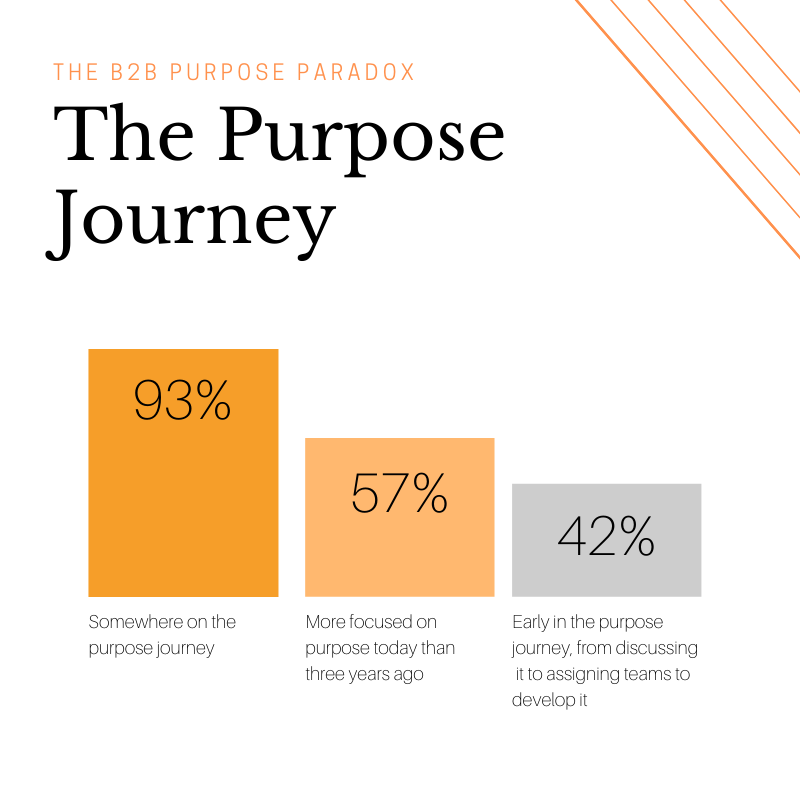Brief • 3 min Read

NEW YORK (February 11, 2020) — B2B companies overwhelmingly believe it is essential to bring a sense of purpose to their organizations, but they lack the critical knowledge and capabilities necessary to activate successful purpose-oriented initiatives.
That is the key finding of a new report, The B2B Purpose Paradox, a collaborative effort conducted by the ANA, Carol Cone ON PURPOSE, and the Harris Poll.
The study revealed that 86 percent of B2B companies embrace purpose as important to growth, but they are still on the path to implementing purpose so that it influences business and social outcomes. However, only 24 percent said purpose is embedded in their business to the point of influencing innovation, operations, and their engagement with society. This is the “B2B Purpose Paradox.”
“Purpose has clearly become an integral growth strategy for companies, which is why the ANA created the Center for Brand Purpose last year,” said ANA CEO Bob Liodice. “This report shows that the fundamental strategic business challenge is to activate purpose programs that permeate the entire organization and effectively reach their customer communities.”
Carol Cone, CEO of Carol Cone ON PURPOSE added: “B2B companies are far more advanced in their purpose journeys than we expected. Yet there is a significant gap between companies with a Stated Purpose—their reason for being, beyond profits—and their Activated Purpose, one that is fully-embedded in the organization to influence culture, innovation, operations, and engagement in society.”
The slow adoption of fully integrated purpose was attributed to purpose feeling more like a PR exercise than an authentic activation (56 percent), purpose not playing a role within the competitive set (51 percent), and lacking the ability to operate with purpose at the center of the business (50 percent).
The report defines purpose as “a company’s reason for being beyond profits that guides its business growth and impact on society.”
PURPOSE IMPACTS
The report revealed significant support of the role of purpose in B2B organizations:
- 87 percent feel purpose protects their company’s reputation.
- 75 percent say purpose supports recruiting.
- 75 percent agree prioritizing purpose had a positive impact on their growth.
- 64 percent feel purpose is critical or nearly critical to everything they do .
ACTIVATING BELIEVERS: INTERNAL PURPOSE AMBASSADORS
The report identified a powerful internal constituency to ignite and activate purpose. Called “Believers,” they comprise 21 percent of employees within respondent companies, and say their company would be more successful with greater focus on purpose.
Believers say purpose can open doors to new customers, guide decision-making, and earn their company a premium price while making a positive impact on society. Believers also are more likely to defend their companies in times of crisis, recruit top candidates, collaborate across the organization, buy from other purpose-driven organizations, and provide better customer service.
LEVERAGING PURPOSE FOR GROWTH
“While the purpose journey doesn’t end, it can always evolve to be more human, engaging, and ultimately more successful,” said Wendy Salomon, Managing Director, Reputation and Corporate Strategy at The Harris Poll. “Establish benchmarks and embed KPIs into organizational strategy, measure progress and pitfalls, and keep pursuing a bold vision for business and social impact.”
The B2B Purpose Paradox also revealed these additional insights:
- B2B companies are increasingly embracing purpose as a driver of business growth, contrary to the commonly accepted belief that they lag well behind their B2C counterparts.
- The C-suite drives purpose strategy within respondent organizations, while HR, corporate strategy, and planning lead implementation.
- Hybrid B2B/B2C companies (serving both consumers and other businesses) are more effectively integrating purpose than companies that are solely B2B.
- The financial services, insurance, and professional services sectors lead in purpose, while manufacturing and telecommunications lag, among the eight industries surveyed.
- B2B companies admire and do business with other companies that are purpose-centric: The majority of B2B purchasing decision-makers choose companies with purpose and are willing to pay more for their products and services.
B2B PURPOSE TO BREAK THROUGH IN 2020
The B2B Purpose Paradox comes on the heels of the Business Roundtable’s 2019 statement on the purpose of a corporation and the 2020 Davos Manifesto on the Universal Purpose of a Company.
Subscribe for more Insights
Subscribe to our newsletter for the latest trends in business, politics, culture, and more.
Subscribe for more Insights
Subscribe to our newsletter for the latest trends in business, politics, culture, and more.
Download now to view the full findings
Related Content








